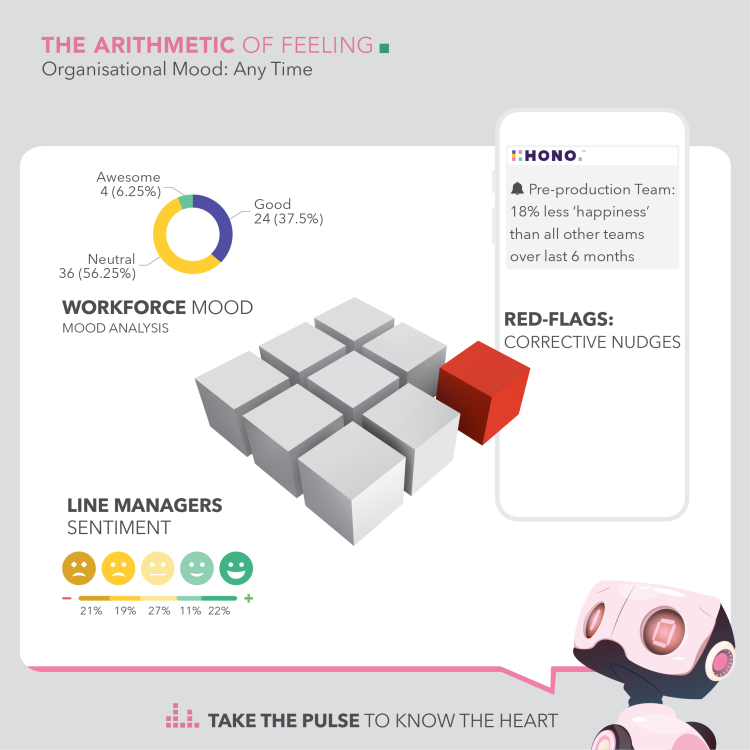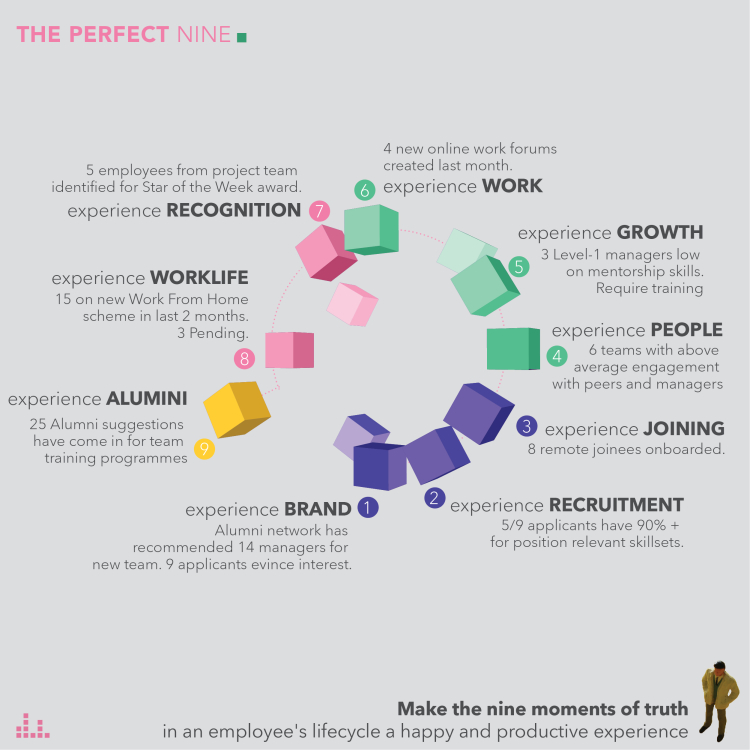Driving Your Business Forward with Employee Surveys: A Step-by-Step Approach
A Deloitte survey of over 4,000 respondents found that over half of employees (62%) consider an organization’s purpose before deciding to join, with over a third (36%) saying that an organization’s purpose was just as important as their salary and benefits package.
Why are employee satisfaction surveys important for organizations?
Employee surveys are one of the most valuable yet underutilized market research tools.
With so many advantages to employee pulse surveys, organizations can take a step in the right path by better knowing their team's needs.
- What are your employees thinking?
- What do they like best about your company?
- What should be improved?
- What are their thoughts on leadership?
This form of an employee survey is a powerful instrument for generating actual change in an organization and enhancing job satisfaction. This can have a significant impact on the overall business as well.

Objectives & Benefits of an employee survey
#Understand key improvement areas
One of the most important advantages of conducting an employee survey is that it can indicate the most important areas for improvement for human resources or leadership teams to focus on.
This critical advantage reveals the fundamental areas and elements that are crucial to employees, as well as those that they are dissatisfied with.
The areas of high relevance and poor satisfaction are prioritized for action by your management and human resources departments.
The survey helps your dedicated teams to figure out the critical issues that need to be prioritized and worked upon.
#Quantify drivers to enhance employee retention
Through regression analysis, a company that conducts employee satisfaction surveys will pay close attention to scores that are low. In other words, what are the most important things that affect satisfaction as a whole?
For example, if your main goal is to keep people loyal, your organization can figure out which factors have the most effect on loyalty.
Basically, regression helps a company make claims like, "If we improve A, B, and C, loyalty will go up by 10%." When you do this, you often find secret grounds for satisfaction.
#Assess satisfaction with management
Employee satisfaction surveys additionally offer management teams a chance to learn more about the factors that make employees content. This kind of information can also help your company come up with unique training and follow-up standards for each manager.
As a member of the HR team, you can use the data to push for change with management and leaders.
#Enhances communication
Another advantage of employee surveys is that they help to open the channels of communication with employees. Employees can give both positive and negative feedback about the organization because everyone has the opportunity to respond.
Overall, it is preferable to be aware of what employees think and require rather than assuming.
#Be a potential driver for change
Employee surveys are an important first step in improving an organization's culture.
Employees can freely express themselves because the responses are anonymous. This is not only a fantastic benefit of employee surveys, but it is also beneficial to employee mental health.
These employee pulse surveys assist you in proactively identifying and addressing common issues in an anonymous forum.
Types of Employee Surveys and When to Use Them
The most common types of employee surveys are:
- Employee engagement surveys
- Employee experience surveys
- Employee effectiveness surveys
#Employee engagement survey
The most effective employee engagement surveys guide you through the entire process of obtaining feedback, sharing it with your team, and acting on the results.
A key part of a good employee involvement survey is making it easy to look at the data collected and create reports from it.
You should also be able to evaluate employee survey questions’ results to determine what factors influence employee engagement positively or adversely. Understanding what factors influence employee engagement allows you to target specific areas for improvement and build a more positive business culture.
#Employee experience survey
- Candidate feedback survey
This feedback can inform you how the majority of candidates learned about your job vacancies, what they were most interested in at your organization, and how they felt about the recruitment process.
2. Onboarding survey
These surveys generate employee-specific results that can lead to in-depth conversation and action planning.
3. Exit Survey
Exit surveys can help you learn how employees in transition perceive your organization. You should look for an exit survey that tells you why workers are leaving, where they are going, and how they liked working for your company.
- Employee effectiveness survey
Employee effectiveness surveys provide individuals with direct and honest feedback from their colleagues. Rather than being used for performance review, this information allows the individual employee to understand where they thrive and where they need to improve.

How can organizations ensure the privacy of employee survey responses?
It is critical to collect employee feedback survey responses in a secure and ethical manner to preserve their confidentiality and anonymity. Dedicated HR teams or employee engagement teams should use a unique and random survey link or code for each respondent, avoiding the usage of identifiers such as name, email, or employee number. The survey link or code should be sent via a neutral and accessible channel, such as an intranet or company-wide email.
What are the best practices for designing effective employee satisfaction survey questions?
- Determine the goals of the survey
The most crucial component of conducting a survey is determining the purpose. Clarify the survey's purpose by asking yourself why it is important to the organization and what you hope to achieve with it. A defined purpose provides your survey a focus and encourages your staff to participate more passionately.
- Select the correct method
It is critical that you choose a suitable survey approach. There are various procedures for conducting surveys, just as there are different kinds of surveys. The survey methodology is determined by a number of elements, including the number of survey participants, the ease of distributing the employee satisfaction survey questions, the ease of collecting responses, and so on.
- Design Questionnaire
Make a list of important subjects to include in the questionnaire based on the survey purpose and target audience. Make sure that any question does not negatively impact the way your employees get along with each other.
Try to ask positive questions rather than normal social norms that invite criticism from coworkers.
- Communicate the importance
Once you've determined the purpose of the survey, the next step is to ensure that the employees understand the significance of the survey. And that their involvement is required. Many surveys fail because the people who take them do not take them seriously.
You need accurate and honest comments for your survey to be successful.
- Promote the survey
Now that the survey questions are ready, all you have to do is get the employees to fill out the survey. To gather responses from everyone, you may need to promote the survey actively. Promote the survey inside the company by posting a notice on the corporate bulletin board or sending an e-mail to all employees. Employees will be more willing to complete the survey if they understand why they are doing it and how they could benefit from it!
- Communicate & Act on the results
Following the completion of the survey, ensure that the results are communicated to your workers. Create a strategy and a set of objectives to be met through a staff survey. Include your staff in the plan and assign them responsibilities so that they can address problems on their own and feel empowered.
How can employee survey findings be used to improve employee satisfaction?
Organizations can improve by surveying employees. Employee survey results can increase satisfaction and change.
Strategies for leveraging employees' survey results to improve:
- Inform staff about the survey methodology and goal. If they know that their input will be used for the benefit of the company, employees will be more honest and open.
- Review the survey results and prioritize improvements. Don't dwell on criticism. Even if employees are satisfied, find ways to improve.
- Explain to staff how the survey results will be utilized to make improvements. Employees must feel heard and their issues addressed.
- Change based on survey responses and monitor results. Don't ignore feedback. Enhance employee satisfaction.
Examples of how employee survey questions’ results can be used to enhance the organization:
- The company may improve benefits if the survey shows employee dissatisfaction.
- If the survey shows overworked employees, the company can adjust work-life balance policies.
- If the survey shows managers aren't supporting staff, the company can train them.
Organizations can improve employee satisfaction and efficiency by implementing survey results.
What is the optimal frequency for employee surveys?
The frequency with which organizations should conduct employee pulse surveys to keep a pulse on employee opinion is determined by a variety of factors, including the organization's size and structure, the industry in which it works, and the organization's employee engagement goals.
Employee satisfaction surveys should be conducted at least once a year in general. This will provide them with a baseline awareness of employee opinion and help them to identify areas for improvement. Some organizations, on the other hand, may benefit from doing surveys more frequently, such as every six months or every quarter. This is especially useful for organizations undergoing considerable transformation or attempting to enhance employee engagement quickly.
With HONO Pulse, we offer more than just surveys. Our advanced platform provides real-time response tracking, comprehensive reporting, and actionable insights backed by AI technology. Leverage the power of HONO Pulse to drive continuous improvement, foster a positive and engaging workplace culture, and propel our organization toward even greater success.
HONO Pulse lets you easily conduct insightful surveys tailored to specific areas, enabling you to gather valuable feedback, make data-driven decisions, and drive positive change within our organization. To learn more about HONO Pulse and its capabilities or to schedule a demo, please reach out to our dedicated team - Request a Demo. Let's embark on this feedback journey together and unlock the full potential of our employee engagement, experience, and effectiveness.

Author:
HONO Desk
SUBSCRIBE NEWSLETTER
For HR innovation updates
Download free HR Case Studies





